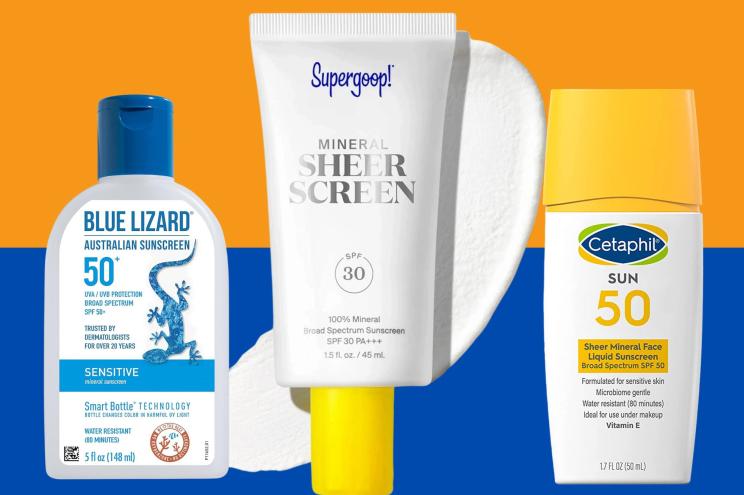As summertime draws near, we have to stop and think for a moment. It’s recommended to wear facial sunscreen daily and a quality body sunscreen when exposed to the sun. That means, if you’re out and about basking in the sun’s rays, you’re squeezing, spraying and spreading a lot of sunscreen on your body.
That’s why it’s important to understand the ingredients you’re applying to the surface of your skin — as you would with your favorite skincare products, like a moisturizer with SPF. To nurture and protect your skin, opting for a well-formulated mineral sunscreen, like Supergoop! Mineral Sheerscreen Sunscreen SPF 30 PA+++ or Blue Lizard Sensitive Mineral Sunscreen SPF 50+ is your best bet.
- Best Overall: Supergoop! Mineral Sheerscreen Sunscreen SPF 30 PA+++
- Best for Sensitive: Blue Lizard Sensitive Mineral Sunscreen SPF 50+
- Best Dermatologist Pick: La Roche-Posay Anthelios Mineral Face Sunscreen SPF 50
- Best Body Mineral Sunscreen: CeraVe Hydrating Mineral Sunscreen SPF 50
- Best Drugstore: Neutrogena Sheer Zinc Mineral Sunscreen SPF 50
- Best for Kids: TruKid Eczema Daily Sunscreen SPF 30
- Best Splurge: ALASTIN Skincare SilkSHIELD All Mineral Sunscreen SPF 30
- Best Tinted: ALASTIN Skincare HydraTint Pro Mineral Sunscreen SPF 36
- Best for Dry Skin: Bare Republic Sheer Zinc Oxide Mineral Sunscreen SPF 30
- Best for Under Makeup: Supergoop! Glowscreen SPF 40 Sunscreen PA+++
“The use of sunscreen, including mineral sunscreen, is an important part of skin cancer prevention and also helps to prevent photoaging (i.e. wrinkling and discoloration of the skin),” Matthew J. Mahlberg, MD, Denver-based board-certified dermatologist and Mohs surgeon and The Skin Cancer Foundation spokesperson, told the New York Post. “UVA rays tend to penetrate the skin more deeply and cause breakdown of collagen, so the use of zinc-based mineral sunscreens can be especially helpful to prevent photoaging.”
That said, the benefit of sunscreens is only realized with consistent use, so it’s best to choose a sunscreen that you like so long as it is broad-spectrum and ideally SPF 30 or higher, per Dr. Mahlberg.
To make your hunt for skin protection easier, we rounded up the 18 best mineral sunscreens on the market, as recommended by board-certified dermatologists and skin health experts. Our team of experts also shared what’s important to know about mineral sunscreens — including ingredients and application best practices — in our in-depth FAQ section.
Best Mineral Sunscreens
Best Overall: Supergoop! Mineral Sheerscreen Sunscreen SPF 30 PA+++
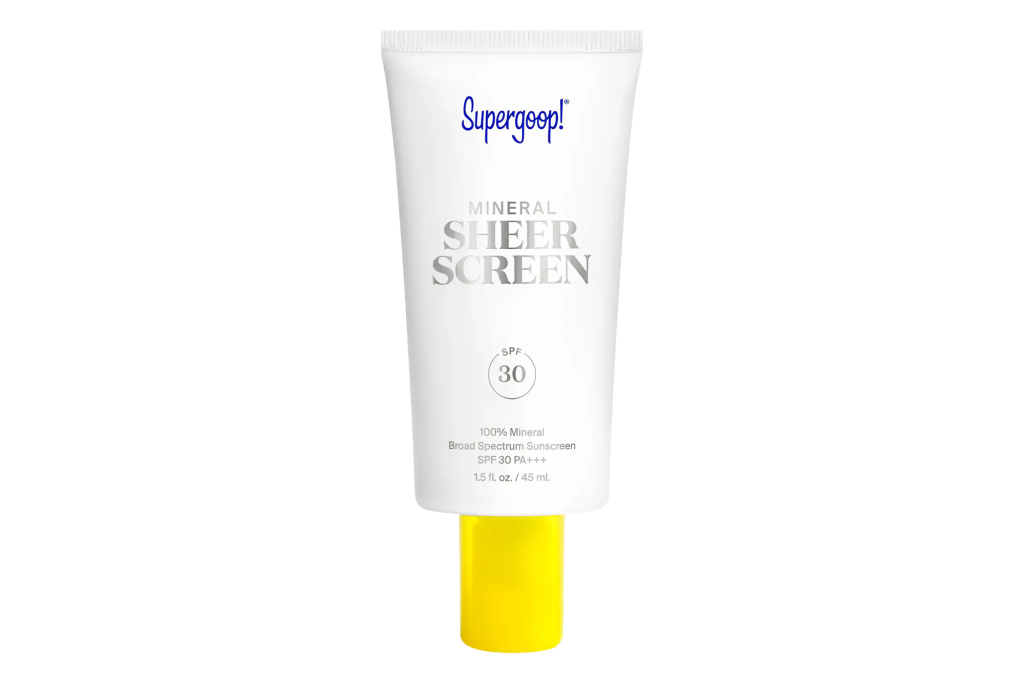
Pros:
- Absorbs quickly
- Filters out blue light
- Good for all skin tones
Cons:
- The reviews on this sunscreen are largely positive, though several customers complain that its scent is off-putting or/and too strong
“Patients love this brand because it does not feel or smell like sunscreen,” Gloria Lin, MD, board-certified dermatologist at Schweiger Dermatology Group and precept resident clinic at Elmhurst Hospital for the Mount Sinai dermatology residents told The Post. “It rubs in easily and does not leave the unwanted white cast on the face.”
She says some patients allow the Supergoop! Mineral Sheerscreen Sunscreen SPF 30 PA+++ to double as their makeup primer. “The mineral one does contain both zinc oxide and titanium dioxide,” she adds. “It also has ingredients like bamboo extract to protect against free radical damage and wild butterfly ginger to protect against blue light.”
Active Ingredients: Zinc oxide, Titanium dioxide
Best for Sensitive: Blue Lizard Sensitive Mineral Sunscreen SPF 50+
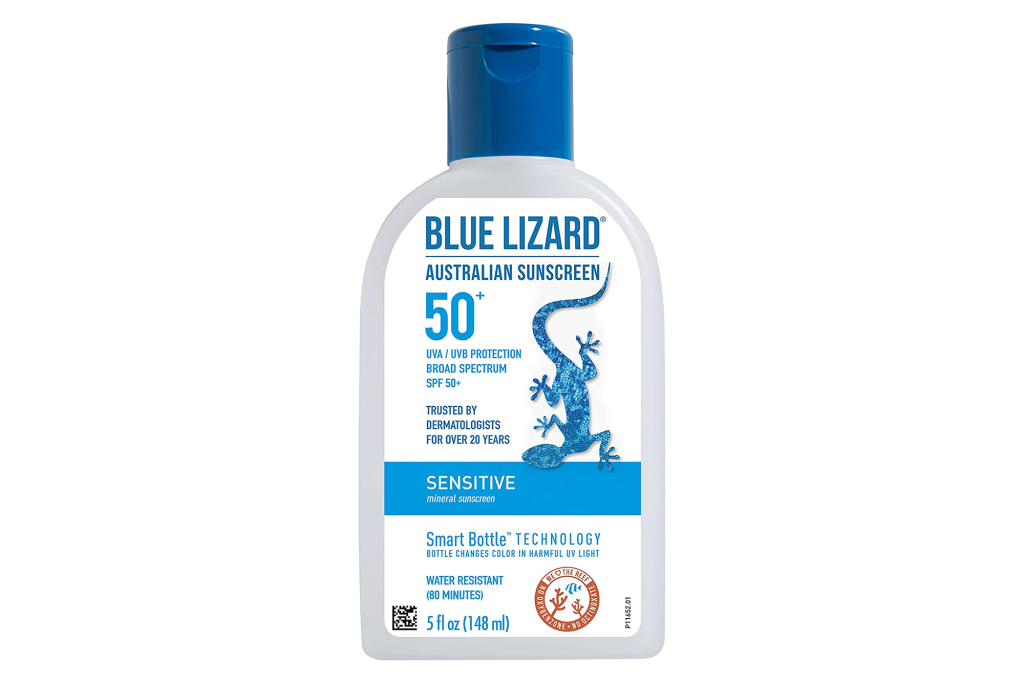
Pros:
- Ideal for those with sensitive skin, including eczema or rosacea
- Oxybenzone and octinoxate-free
- Lotion formula feels more soothing and hydrating than a spray sunscreen
Cons:
- It has a heavier consistency, which makes it great for the outdoors, but not for everyday wear
- Leaves a white cast, which may be more noticeable on those with darker skin tones
“This is another great option for more sensitive skin since it does not contain fragrances or parabens,” Lin highlights. “Parents often like this brand for their children since it is more gentle. The bottle cap also changes color when exposed to UV light to help remind patients to apply sunscreen.”
Plus, the formulation is water-resistant up to 80 minutes.
Our Commerce Editorial Director, Barret Wertz, also recommends this mineral sunscreen and Blue Lizard in general.
“If you’re looking for a trustworthy, gentle sunscreen, just about anything from the Australian brand Blue Lizard is a solid choice,” he told The Post. “This fragrance-free mineral sunscreen uses tried-and-true zinc oxide to provide broad-spectrum UVA/UVB protection.”
He’s also a fan of the color change the sunscreen is known for, as he finds it an “excellent reminder” to reapply throughout the day.
Active Ingredients: Zinc Oxide, Titanium Dioxide
Best Dermatologist Recommended: La Roche-Posay Anthelios Mineral Face Sunscreen SPF 50

Pros:
- Silky and lightweight consistency
- Great for sensitive skin
- Lays perfectly under makeup
Cons:
- Price point may be an issue for some
The La Roche-Posay Anthelios Mineral Sunscreen SPF 50 is one of my most-worn sunscreens because it’s as light as silk, applies like a serum and doesn’t leave a white cast. Traditionally, areas of my face — like the top of my forehead and my nose — tend to become red in the sun, but not with this formula. It’s quite moisturizing, too, and a dream for sensitive skin. It never lets me down and always remains either on my bathroom counter or beach bag. Ten out of ten recommend.
After interviewing Peredo, she shared one of her top brands is La Roche-Posay — one she widely recommends, too! Shop the brand’s Anthelios Mineral Face Sunscreen SPF 50 for a less-than-$40 grab that’ll last you for months. It’s backed by more than 3,000 reviews for “not leaving the face oily” and “blending perfectly.”
Active Ingredients: Titanium Dioxide, Zinc Oxide
Best Body Mineral Sunscreen: CeraVe Hydrating Mineral Sunscreen SPF 50
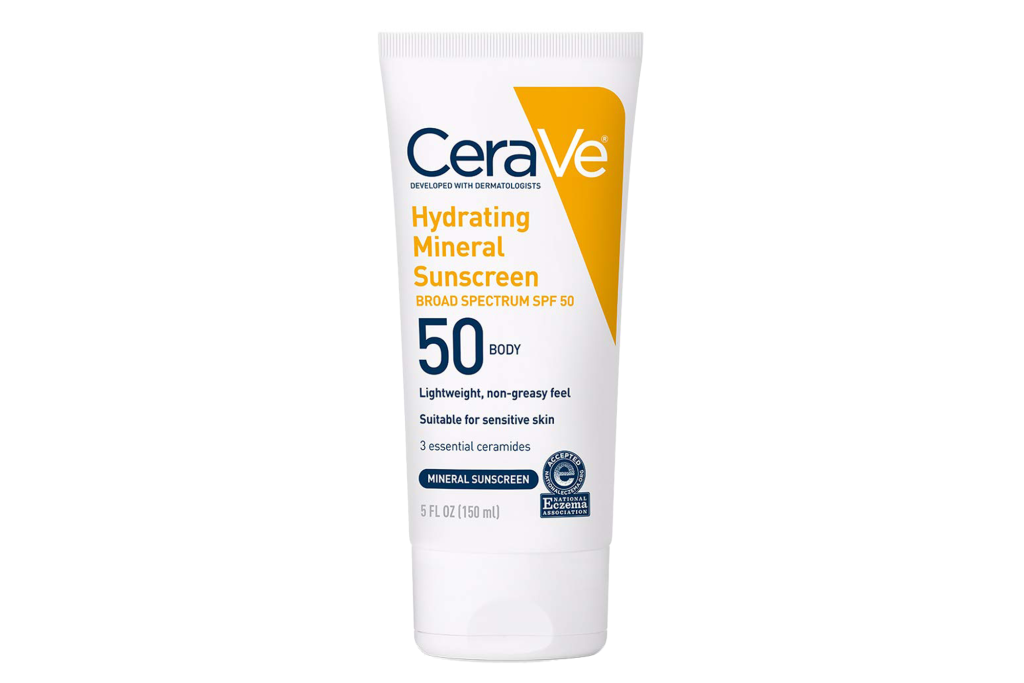
Pros:
- Budget-friendly
- Reformulated to minimize white cast
- Fragrance-free, and National Eczema Association (NEA) accepted
Cons:
- Has a heavier feel
With nearly 2,500 rave reviews on Amazon for being “great for sensitive skin” and “making the skin look flawless,” the CeraVe Hydrating Mineral Sunscreen SPF 50 is worth the less-than-$15 price tag, especially for being a renowned dermatologist-tested brand.
“Its original formulation was difficult to rub in and had a distinct white cast,” said Dr. Lin. “However, the brand has since changed it, so it is much more user-friendly now. Its mineral version contains both zinc oxide and titanium dioxide along with ceramides to hydrate the skin.”
Active Ingredients: Titanium Dioxide, Zinc Oxide
Best Drugstore: Neutrogena Sheer Zinc Mineral Sunscreen SPF 50
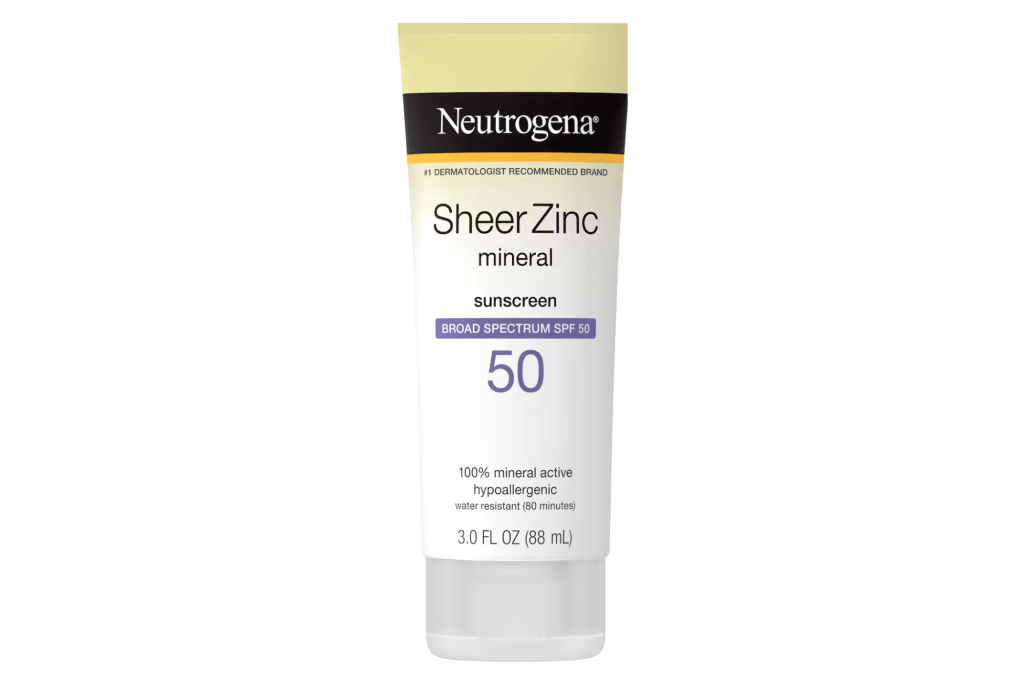
Pros:
- Softens skin without feeling too heavy
- Oil-free
- Can be used on both the body and face
Cons:
- Can leave a film on the skin
Neutrogena has a bounty of sunscreens on the market, and Dr. Peredo recommends the brand’s mineral sunscreen as a wonderful option to purchase ahead of your next beach trip or poolside soiree.
“This is a great drugstore option that can be used for the body,” she says. Our Commerce Updates Editor Holly J. Coley has brought it with her on vacation and says it’s not a bad choice if you prefer a mineral-based sunscreen.
“I’m a fan of Neutrogena in general, so I’m always willing to try any product from the brand,” Coley said. “I used this sunscreen when I went to Miami and Myrtle Beach. As a POC, I don’t love the white cast most mineral sunscreens have. However, this one didn’t make me look chalky. The cast does go away after a few minutes, though it does leave a sort of sheen in its place — sort of like a highlighter. I found it fairly lightweight too, which is always a plus in the summer heat.”
Active Ingredients: Zinc oxide
Best for Kids: TruKid Eczema Daily Sunscreen SPF 30
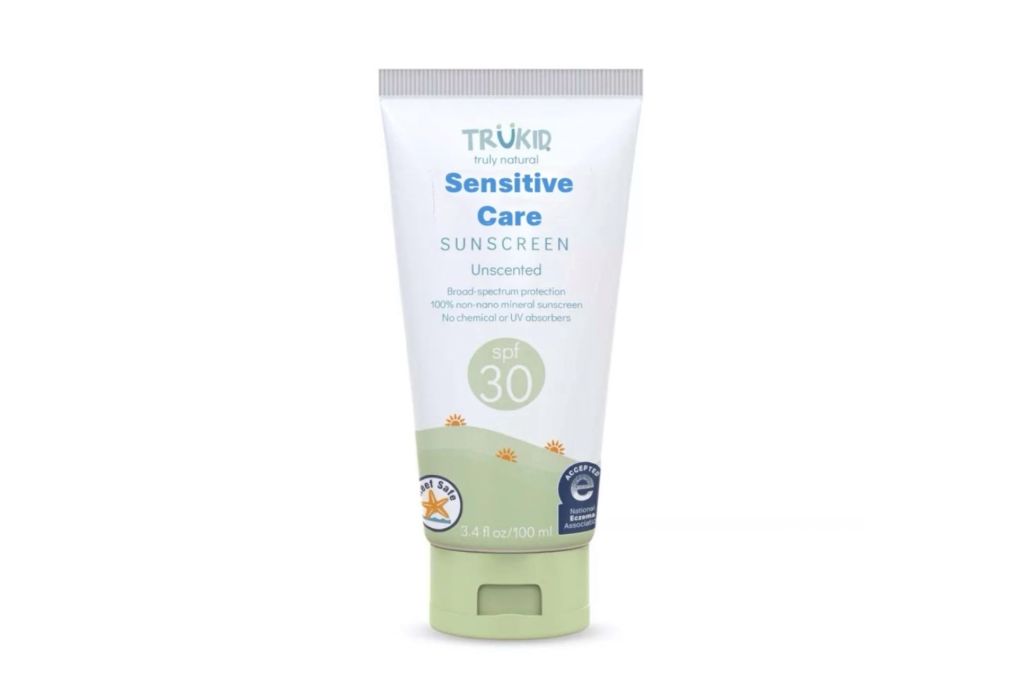
Pros:
- Paraben, sulfate, and phthalates-free
- Also can be used by adults
- Available in three other scents, including unscented
Cons:
- Not waterproof
If you’re looking for a physical sunscreen for your little one, this is the one Commerce Writer Miska Salemann uses for her kiddo. Along with zinc oxide, it has vitamin E, and hyaluronic acid to lock in moisture, so baby’s skin stays hydrated and soft.
Available in a variety of natural scents, Salemann likes how gentle but effective the formula is.
“For a solid daily sunscreen, I’ve used the TruKid Eczema Daily Sunscreen on my one-year-old,” she told The Post.
“My daughter inherited my very sensitive skin, so I wanted to find something very clean and gentle, as well as tested on many babies with eczema. I love that this formula incorporates aloe vera to help soothe the skin, as well as jojoba oil to aid in any burn healing. Her skin has never had a bad reaction. The SPF count is slightly lower, but we use this on overcast days where the sun could be sneaky. It smells lovely as well — like citrus.”
Active Ingredients: Zinc Oxide
Best Splurge: ALASTIN Skincare SilkSHIELD All Mineral Sunscreen SPF 30
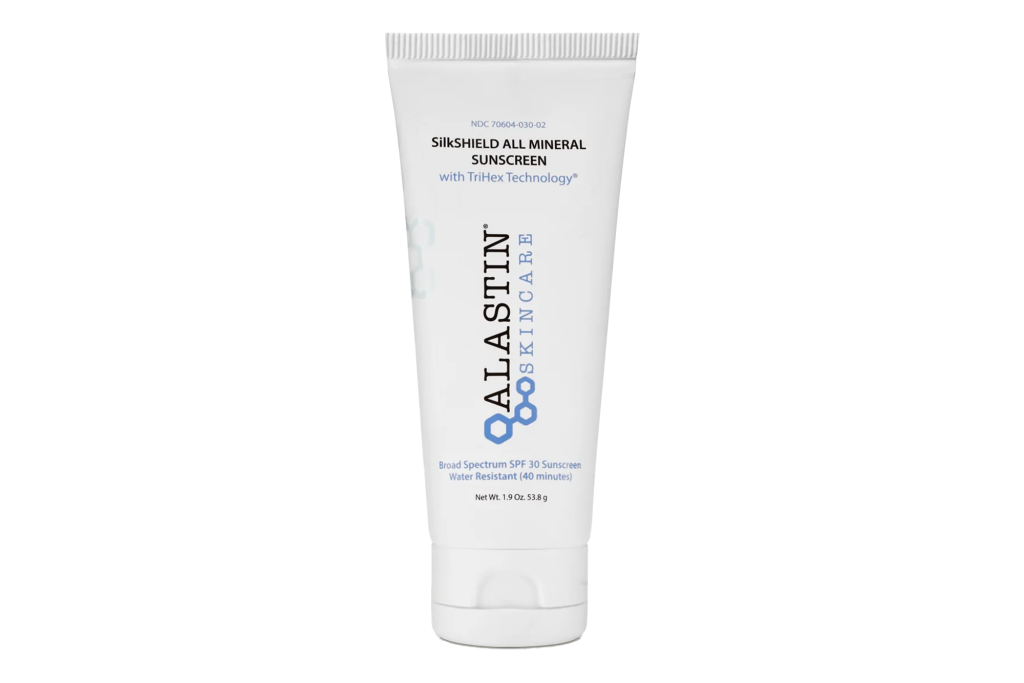
Pros:
- Uses aloe leaf extract and cucumber to moisturize
- Has peptides to provide skincare benefits
- Filters blue light, as well as UVA and UVB rays
Cons:
- White cast makes this less ideal for those with darker skin tones
The ALASTIN Skincare SilkSHIELD All Mineral Sunscreen SPF 30 is an investment worth making, namely for its transparent application and gentle yet effective formulation.
“It’s light and moisturizing, while also providing broad-spectrum protection,” Marina Peredo, MD, board-certified dermatologist who specializes in aesthetic dermatology and owner of her practice, Skinfluence, told The Post. “It’s formulated with cucumber and aloe leaf extract which calms the skin and is water-resistant, gluten free, paraben free and cruelty free.”
Active Ingredients: Zinc oxide
Best Tinted: ALASTIN Skincare HydraTint Pro Mineral Sunscreen SPF 36
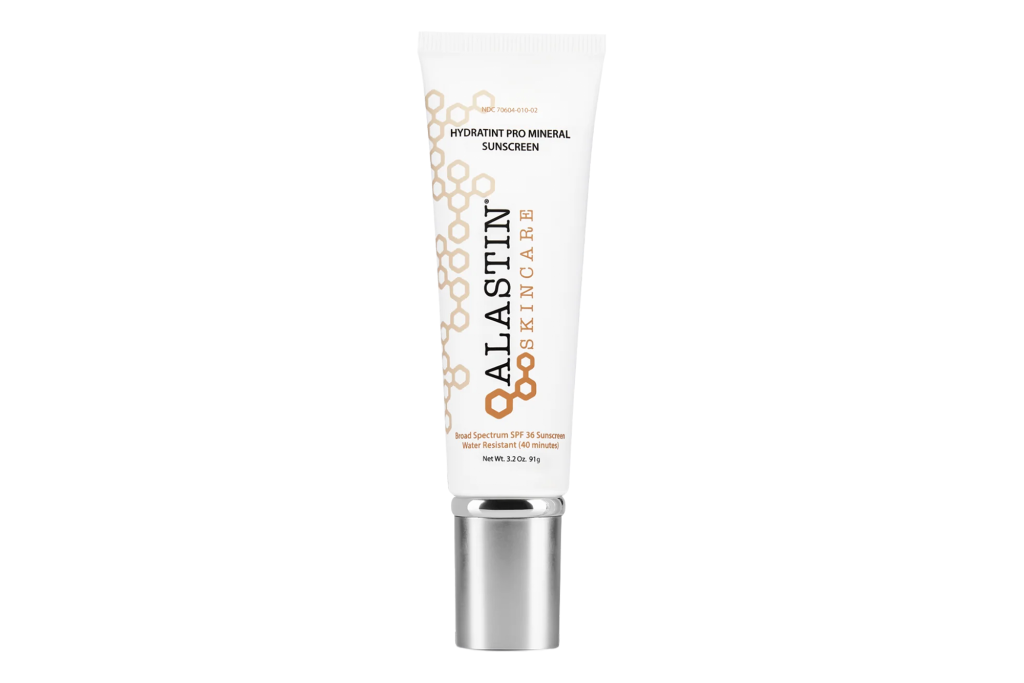
Pros:
- Lightweight but moisturizing
- Hypoallergenic
Cons:
- Tube is small, especially for the price
“This is one of my favorites for the face because it has a tint and gives an extra layer of protection,” Peredo says, recommending the ALASTIN Skincare HydraTint Pro Mineral Sunscreen SPF 36. “It has a universal tint and is lightweight.”
For more options, check out our expert-backed guide to the best tinted moisturizers for more products that boast a buildable, lightweight finish.
Best for Dry Skin: Bare Republic Sheer Zinc Oxide Mineral Sunscreen SPF 30

Pros:
- Reef-friendly, and paraben-free
- Gel-like texture
- Contains hydrating raspberry and carrot seed oils, which also fight against free radicals
Cons:
- Prone to pilling
“This brand is designed to be more lightweight with its cream to powder formulation,” Lin shares, recommending Bare Republic. “It contains both zinc oxide and titanium dioxide.”
More, it also has antioxidant ingredients like raspberry, grape and carrot seed oils that are designed to help against free radical formation, per Lin.
Active Ingredients: Zinc Oxide
Best for Under Makeup: Supergoop! Glowscreen SPF 40 Sunscreen PA+++
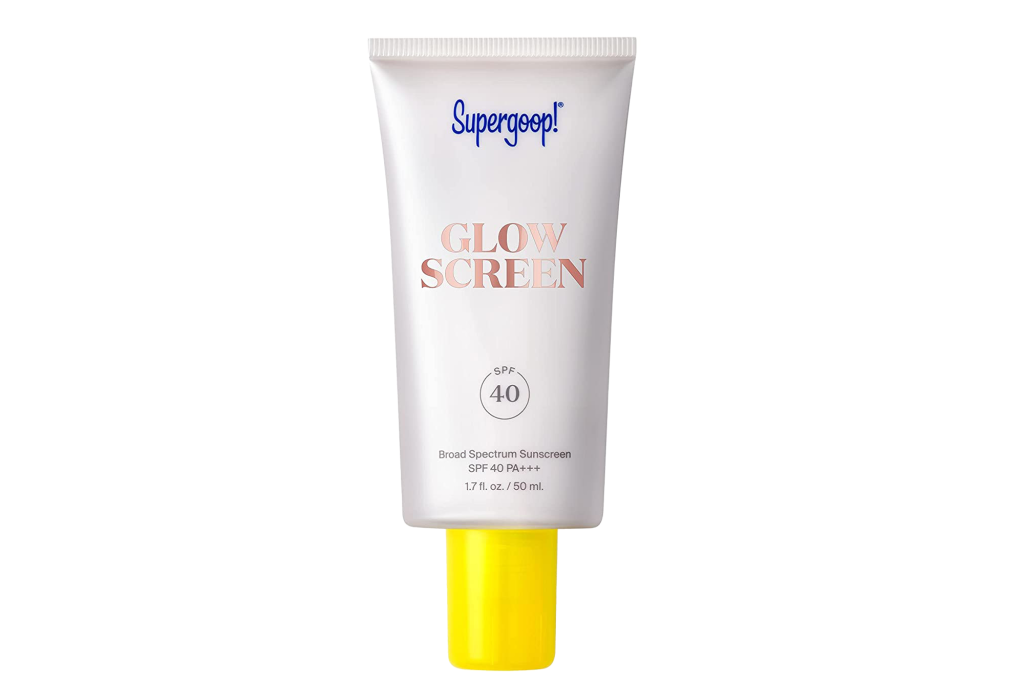
Pros:
- Filters blue light
- Doubles as a primer
- Contains hyaluronic acid, vitamin B5, and niacinamide
Cons:
- Smells like lavender, which isn’t bad but also not ideal for those who prefer a fragrance-free sunscreen
“This is great because it has hyaluronic acid and Vitamin B5 to hydrate the skin,” Peredo shares. “It is clean and suitable for all skin types.”
Even better, it helps protect against UVA and UVB rays, thanks to its PA+++ formulation. Note: the more + signs, the more protection you’ll receive.
Active Ingredients: Avobenzone, Octisalate, Octocrylene
Best with Zinc:Sun Bum Mineral Sunscreen Lotion SPF 50

Pros:
- Hypoallergenic
- Reef-friendly
- Water-resistant for 80 minutes before reapplication is needed
Cons:
- Because it’s fragrance-free, the sunscreen is missing the well known “SunBum” scent that many customers love
“Parents often like this for their children as there is a mineral spray version that rubs in well,” Lin shares. “Caution should be used during application, and it should be rubbed in afterwards to ensure even coverage and adequate protection.”
Even better, it’s a wonderful option that’s vegan, hypoallergenic and less than $20.
Active Ingredients: Zinc Oxide
Best Korean: Dr. Jart Every Sun Day Mineral Face Sunscreen SPF 50+
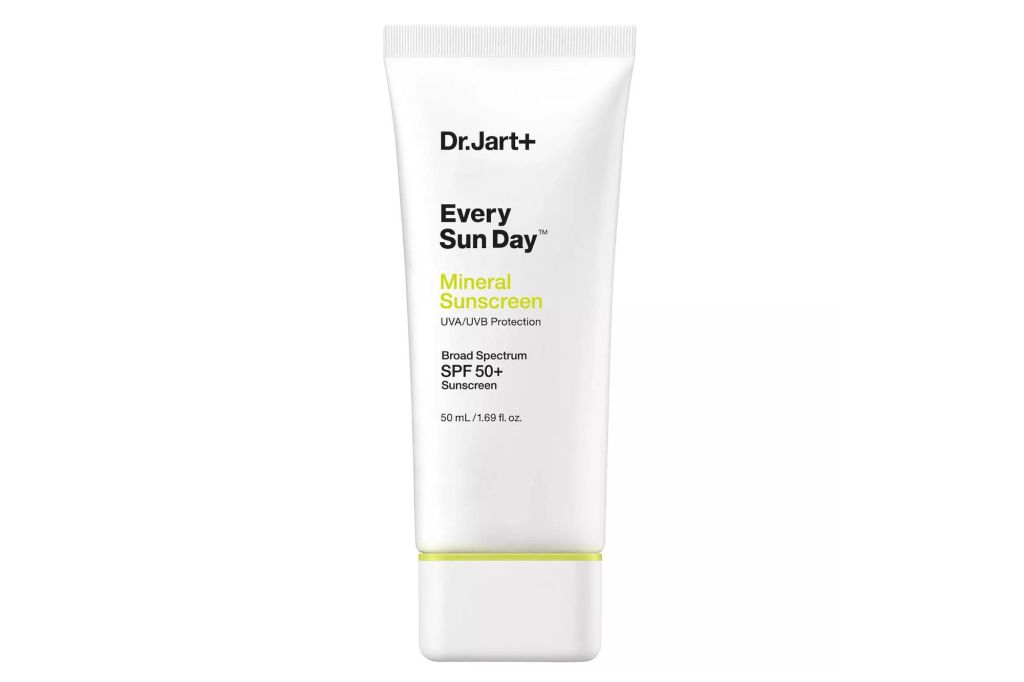
Pros:
- No white cast
- Doesn’t clog pores, and absorbs fast
Cons:
- Consistency is on the thicker side
Small enough to fit in your purse for touch-ups, this Korean beauty mineral sunscreen is a must-try. It goes on buttery smooth, sets quickly, and even serves as a base for makeup. Gentle enough for those with sensitive skin, it also has a matte finish which those who are prone to oily spots will appreciate.
Active Ingredients: Zinc Oxide
Best Sheer: Cetaphil Sheer Mineral Face Lotion SPF 50
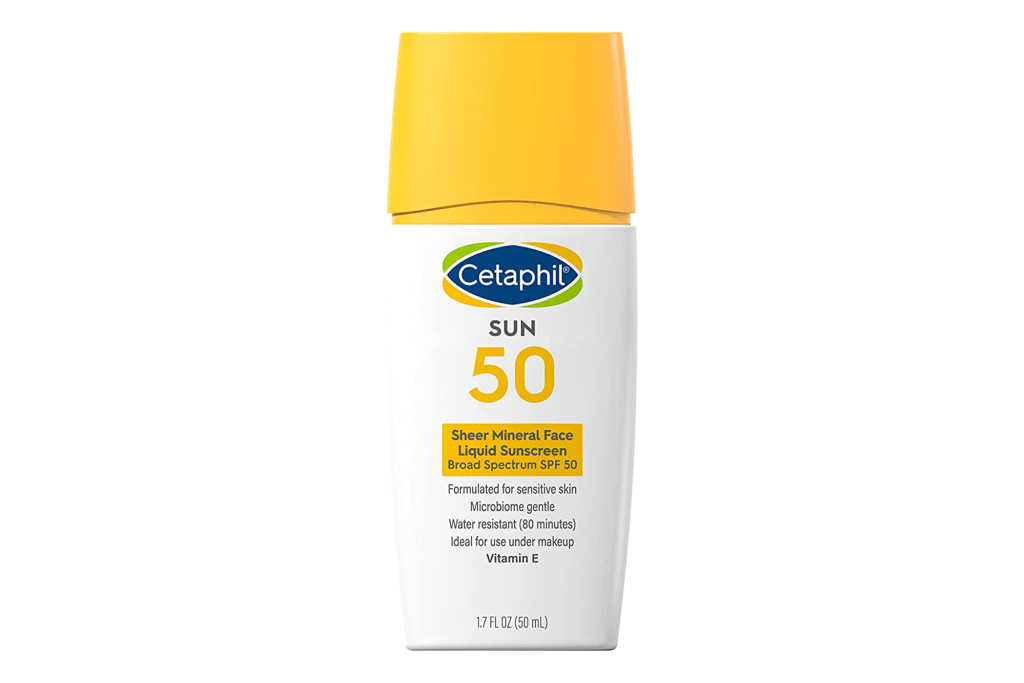
Pros:
- Great for those with sensitive
- Moisturizing without leaving a greasy residue
- Matte finish
Cons:
- The bottle is very small — like the size of a dollar bill small
- For most skin tones, this mineral sunscreen will dry sheer if rubbed in well. However, a cast may be slightly visible on those with darker skin tones
“Cetaphil is a good brand for sensitive skin given its hypoallergenic formula,” Lin notes. “This sunscreen tends to feel more lightweight and non-greasy.”
Even better, it’s adored by more than 10,000 users, with one Amazon review writing, “after trial and error, this is the winner for non-tinted mineral sunscreen for the face.”
Active Ingredients: Zinc Oxide
Best Stick: COOLA Organic Mineral Sunscreen SPF 50 Sunblock Stick
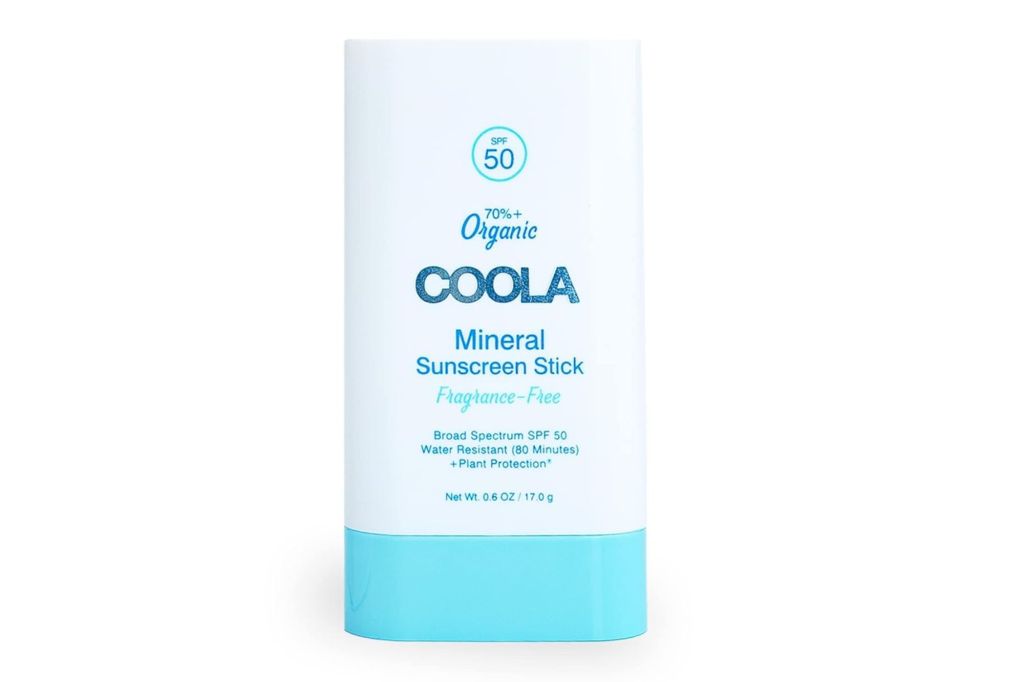
Pros:
- Mess-free application
- Fragrance-free
- Moisturizing
Cons:
- The glide of the product could be better
There are several benefits to a stick mineral sunscreen. For one thing, you don’t have to touch your face to apply it, which is nice, because germs. Secondly, it’s less messy, and easy to carry around in a pocket or bag.
This option from COOLA is completely fragrance-free and has sunflower oil to add hydration into the mix. It’s also made with 70% organic ingredients, which we’re not mad at.
Active Ingredients: Nano Zinc Oxide
Best for Acne Prone Skin: EltaMD UV Physical Lightly Tinted Mineral Sunscreen SPF 46
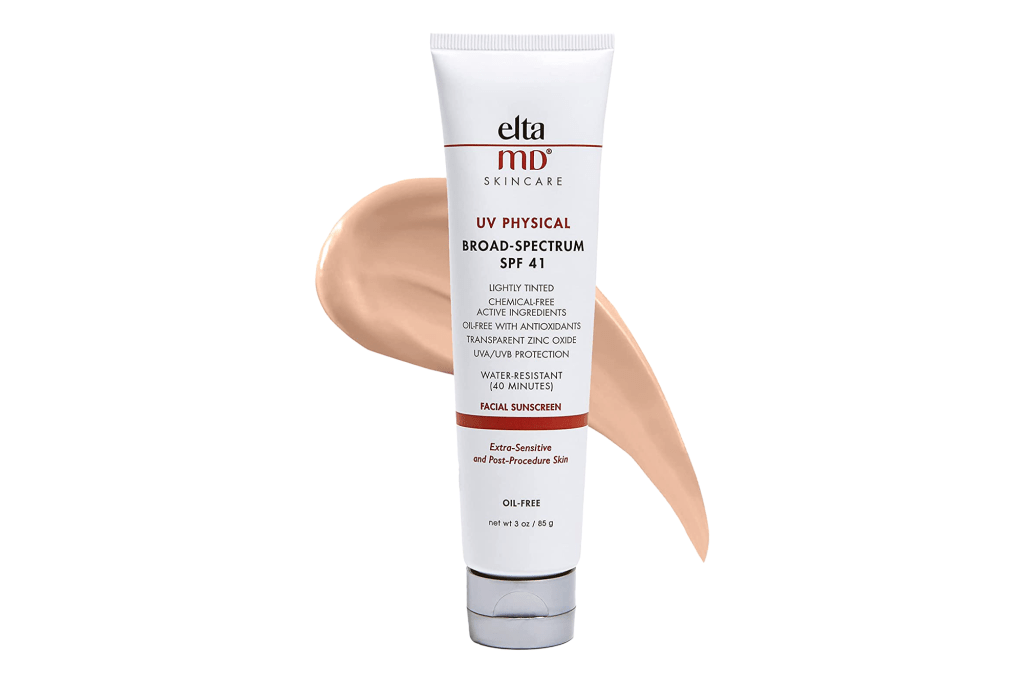
Pros:
- Good for those with oily skin
- Matte finish
- Formulated for those with extra-sensitive skin
Cons:
- Only offers 40 minutes of water resistance, which is half the time of many other sunscreens on our list
“Many patients love this brand because it does not feel or smell like sunscreen,” Lin shares. “It contains hyaluronic acid, which can be helpful for moisturization.”
Additionally, Lin recommends it as a good option for those with more sensitive skin, too, since it’s free of parabens, fragrances, and dyes. “There are clear and tinted options making it suitable for different skin colors,” she adds. Plus, it’s 12,000+ reviews only add to the brand’s acclaim.
Active Ingredients: Zinc Oxide, Titanium Dioxide
Best Tear-Free Formula: Aveeno Positively Mineral Sensitive Skin Sunscreen SPF 50
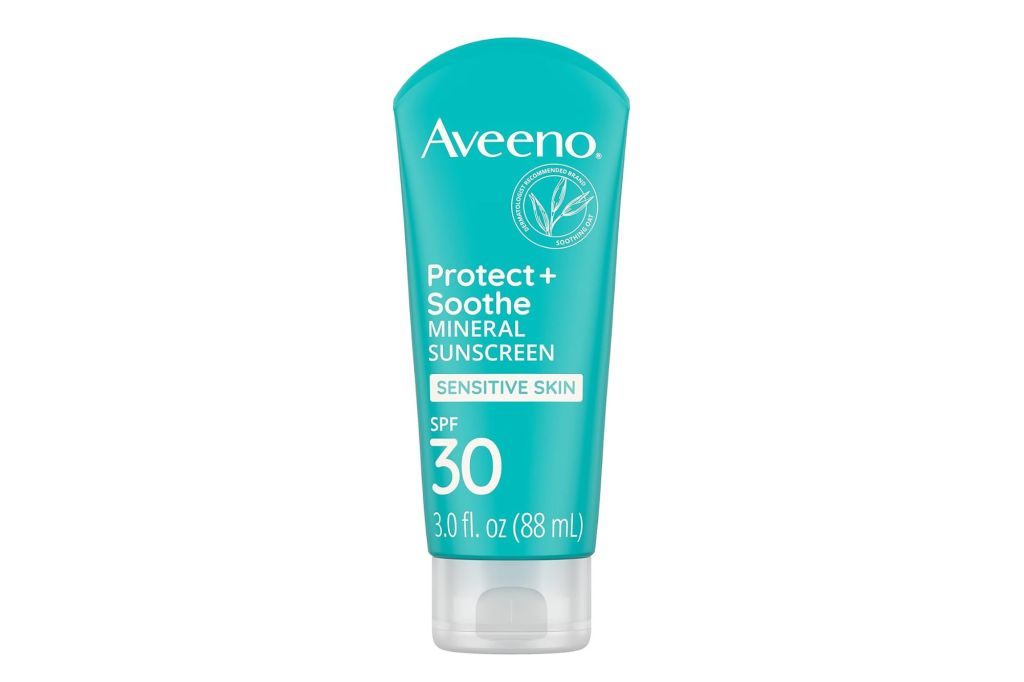
Pros:
- Designed not to irritate eyes
- Moisturizing
Cons:
- Can be difficult to wash off
“I personally find Aveeno’s sunscreen to have a bit of an unusual scent, but some patients do like this since it is meant for sensitive skin with their signature nourishing oat, and it does not contain parabens or dyes,” Lin says. If you’re looking for a 100% mineral option that’ll help nourish your skin, grab this one.
Activate Ingredients: Titanium Dioxide, Zinc Oxide
Best Non-Pore Clogging: ISDIN Eryfotona Actinica Ultralight Emulsion SPF 50+
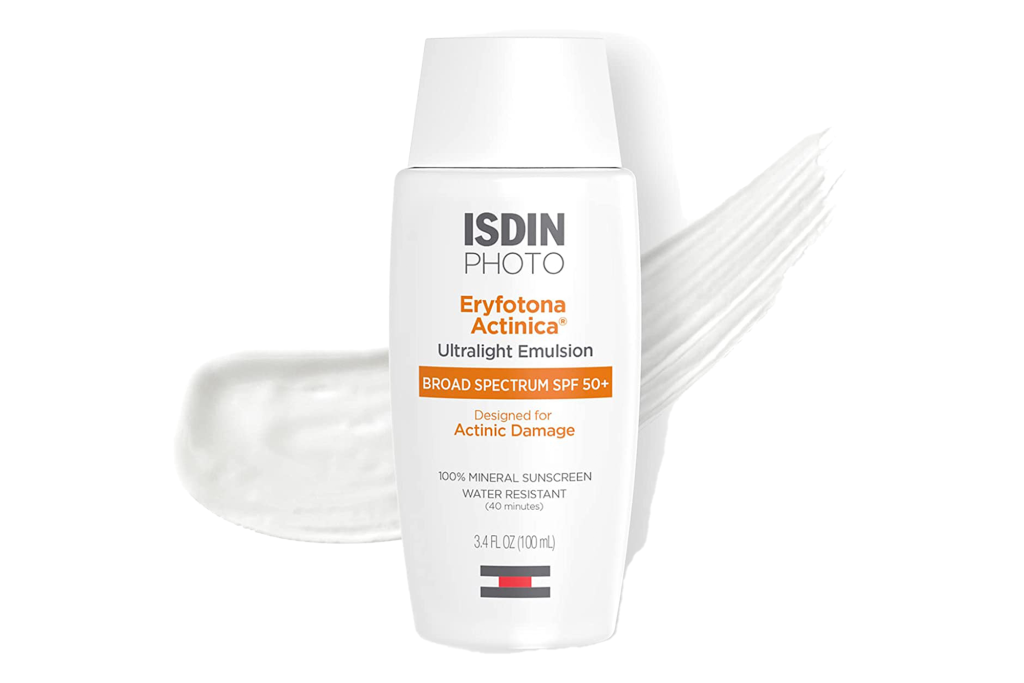
Pros:
- Absorbs fast and works as a base for makeup
- Water-resistant
- Actively repairs sun damage
Cons:
- Not fragrance-free
“This is a higher end more expensive product; however, it may be worth the price tag,” Lin notes. “ISDIN is especially helpful for those with significant sun damage already since it contains ‘DNA Repairsomes’ or plankton-derived enzymes that is designed to repair existing sun damage.”
Not to mention, its water-resistant and lightweight formula makes it dermatologist-recommended for dark skin tones.
Activate Ingredients: Zinc Oxide
Best Powder: Colorescience Brush-On Sunscreen Mineral Powder

Pros:
- Good for those with sensitive or acne-prone skin
- Also protects from blue light rays
- Easy to reapply throughout the day
Cons:
- Although available in four shades, the darkest still isn’t suitable for those with a deeper skin tone
Sunscreen needs to be reapplied throughout the day, which may be difficult if you’re wearing makeup or battling oily skin. A mineral powder sunscreen, like this one from Colorescience, is a great solution, as it doubles as a powder foundation and works to reduce shine. It can also be worn alone, comes in four different colors, and is even water resistant. While we haven’t tested it ourselves (yet), more than 2,000 Amazon shoppers have ordered it this month!
Active Ingredients: Zinc Oxide, Titanium Oxide
Best for All Skin Tones: TIZO Ultra Zinc Body & Face Sunscreen Lotion SPF 40
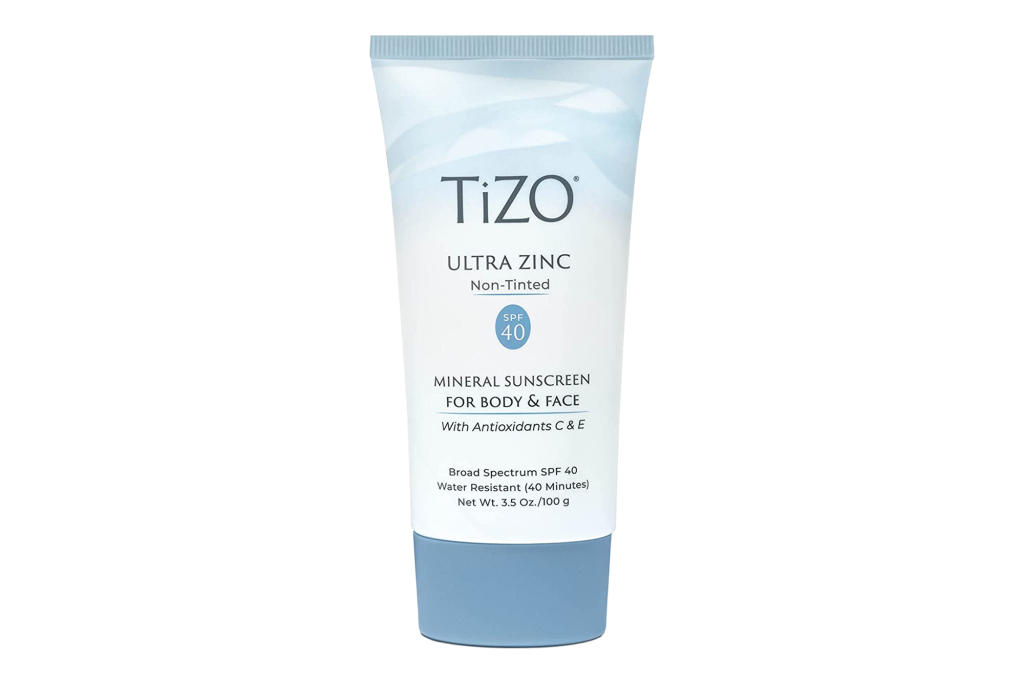
Pros:
- Uses a combo of antioxidants and molecules to fight free radicals
- Phthalates and fragrance-free
- Doesn’t feel too heavy, even under makeup
Cons:
- There are mixed reviews on the dry down of this sunscreen. Some who purchased it on Amazon found it to have a dewy finish, while others found it greasy
- Only water-resistant for 40 minutes
“This contains zinc oxide and is typically considered good even for sensitive skin,” Lin shares, recommending the TIZO Ultra Zinc Body & Face Sunscreen Lotion SPF 40. “The brand has both tinted and un-tinted versions.”
Impressively, TIZO includes vitamins E and C to provide additional antioxidant protection.
Active Ingredients: Zinc Oxide
Best for Face: CoTZ Flawless Complexion Tinted Facial Mineral Sunscreen SPF 50
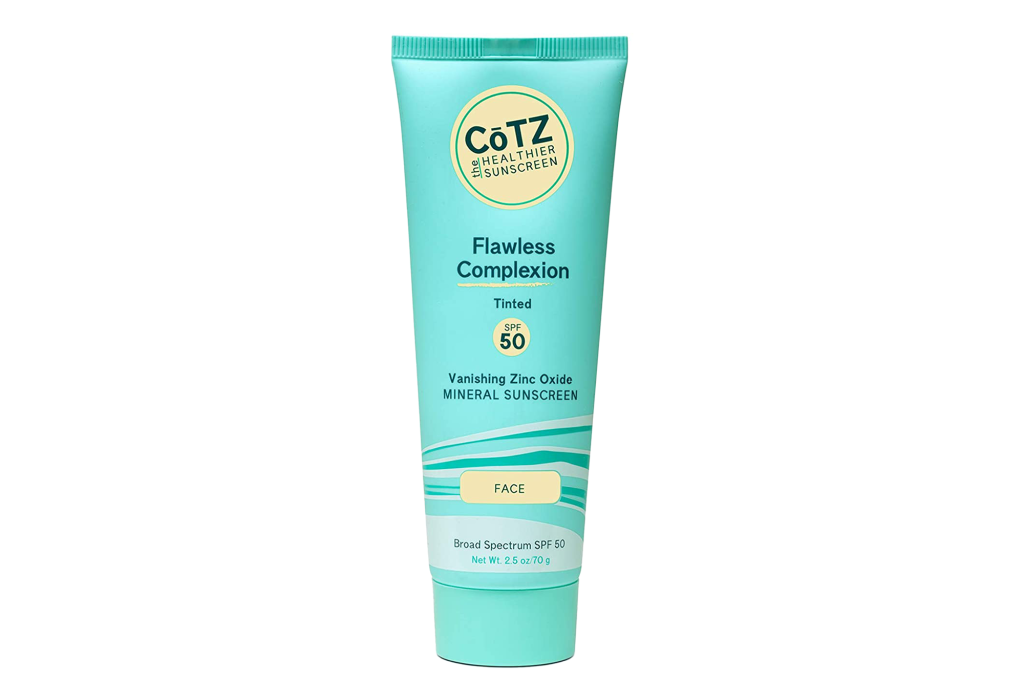
Pros:
- Doesn’t leave white cast, even on those with darker skin tones
- Cruelty-free
- High SPF
- Tinted
Cons:
- On the greasy side, even though the formula is oil-free
“Patients are a fan of the texture of this product since it is more lightweight but still moisturizing,” Lin adds. “It’s oil-free and non-comedogenic, so it would still be good for those with more acne-prone skin.”
Not to mention, if you’re looking for a good facial sunscreen like this travel-friendly option.
Active Ingredients: Zinc Oxide
Best Anti-Aging: Australian Gold Botanical Mineral Lotion SPF 50
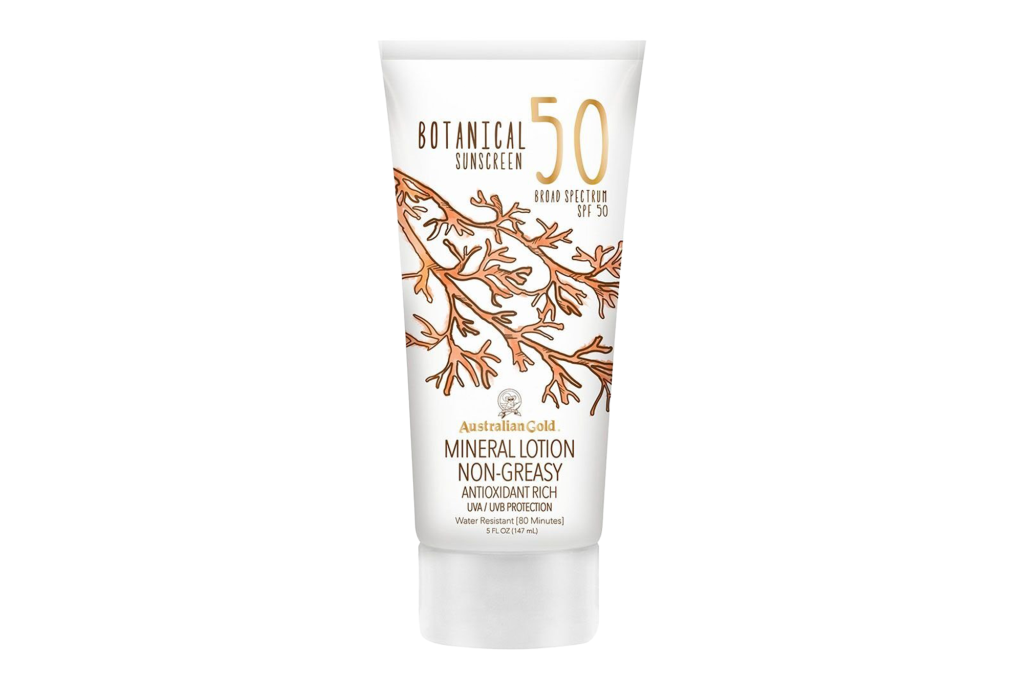
Pros:
- Water resistant for 80 minutes
- Contains brightening vitamin C, which also fights free radicals
- Matte finish
Cons:
- Scent is a little stronger
“This brand may be good for people with active lifestyles as it is harder to wash or sweat off,” Lin suggests, highlighting Australian Gold as a top brand. “It also has antioxidant ingredients like eucalyptus and red algae.”
More, the price also helps make this a crowd favorite
Active Ingredients: Titanium Dioxide, Zinc Oxide
Best Active: SkinCeuticals Physical UV Defense SPF 30
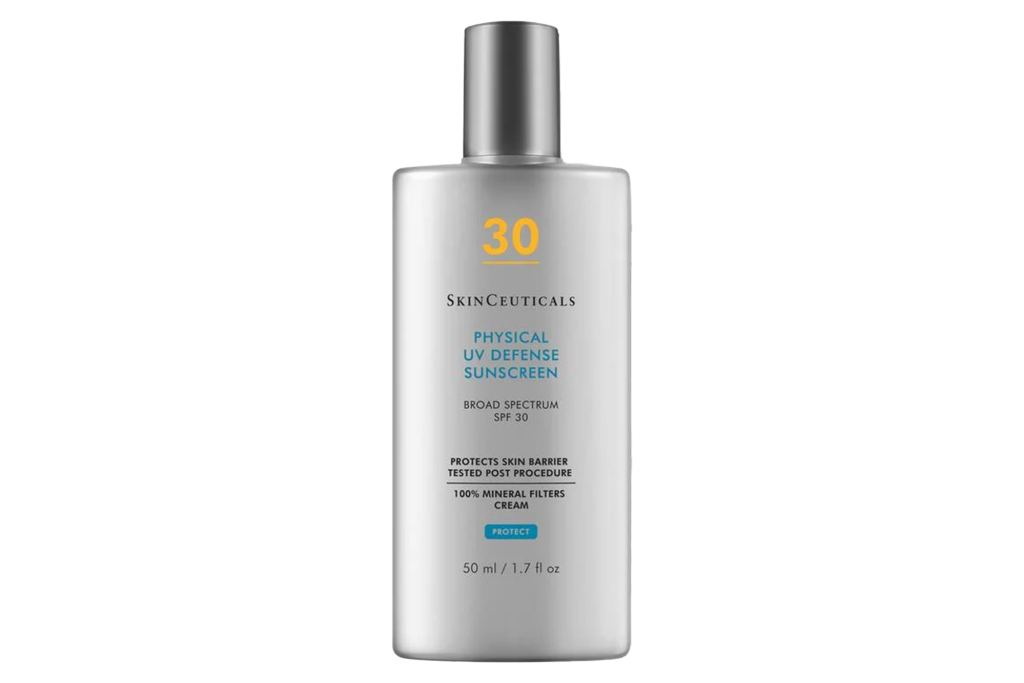
Pros:
- Good for all skin types, including mature skin
- Fragrance-free
- Contains artemia salina to increase skin’s natural photoprotection
Cons:
- It’s difficult to get rid of the white cast, even if the product is rubbed in well
“Many patients like this brand since the sunscreen feels more lightweight and does not clog the pores” Lin adds, recommending SkinCeuticals. “This also contains artemia salina, which is a plankton extract that helps protect against UV damage.”
To top off its benefits, this mineral sunscreen is also water-resistant, so it’s a good option for active lifestyles or beach days.
Active Ingredients: Zinc Oxide, Titanium Oxide
Best Pregnancy Safe: Paula’s Choice Calm Barrier Protection Mineral Sunscreen SPF 30

Pros:
- Gentle, even on reactive or prone to redness skin
- Gel-based, so it feels more hydrating
Cons:
- Some may find the formula on the greasy side, especially if they already have oily skin
Whether you’re pregnant or nursing, this choice from Paula’s Choice is one of our favorite picks. Physical sunscreens are typically safe for mothers-to-be, but we like this one, especially for its gel-cream formula, which feels a touch more luxurious during application. It doesn’t leave a white cast — which no one wants to deal with and it’s also lightweight. Don’t be surprised if you keep using it long after baby has arrived.
Active Ingredients: Titanium Dioxide, Zinc Oxide
An FAQ on Mineral Sunscreen
Ahead, our team of board-certified dermatologists and skin health experts give us the 411 on what to know about mineral sunscreens — including notes on their formulations and ingredients.
First things first: What is mineral sunscreen?
The two main types of UV-blocking ingredients in sunscreen are physical (mineral) and chemical. Many experts also use the terms “organic” and “inorganic” to describe these categories.
“Physical ingredients like zinc oxide and titanium dioxide sit on top of the skin and block UV rays before they can penetrate,” Dr. Mahlberg explains. “You can think of physical sunscreens like shields that reflect the damaging rays of the sun.”
Chemical ingredients, such as avobenzone and octisalate, absorb UV rays and convert them to heat energy before they can cause damage. Many sunscreen products combine organic and inorganic filters. “Both types of filters have been tested as safe and effective, and the most important thing is choosing a sunscreen that you like and feel comfortable wearing,” he adds.
In other words, “mineral or physical sunscreens are formulated with minerals that rest on top of the skin and reflect away the UV rays,” Peredo notes. “They have a physical UV filter which creates a broad-spectrum coverage.”
How do mineral sunscreens differ from chemical sunscreens?
The difference between chemical sunscreens and mineral sunscreens is how they protect your skin against UV rays. “Mineral sunscreens are different from chemical sunscreens because they rest on top of the skin and reflect away the UV rays,” Peredo explains. “Chemical sunscreens are formulated with chemical compounds such as oxybenzone, octinoxate and avobenzone, which absorb and transform UV rays in heat.”
Unlike chemical sunscreens which can cause irritation or an allergic reaction for some patients, the mineral sunscreens are typically better tolerated. “Since these physically protect against UV rays, then it does not require time to be absorbed prior to sun exposure to provide immediate protection,” Lin explains. “This makes it excellent for people in the mornings to simplify their skincare routine.”
More, mineral sunscreens may also last longer in direct sunlight, so it can provide more protection, especially if more frequent reapplication may be difficult. “For those with darker skin types, they do make tinted versions that may be preferable to avoid the harsh white cast of the traditional mineral sunscreens,” Lin suggests.
If you’re searching for a mineral sunscreen for darker skin, TiZo Ultra Zinc ($43) is one we recommend, as it dries clear. Need another? Try the Neutrogena Sheer Zinc Oxide ($16), which also dries clear and has a dewy finish.
How to properly apply mineral sunscreen, according to experts
According to Peredo, apply mineral sunscreen a minimum of 20 minutes before sun exposure to any area of the skin that will be exposed to allow time for the sunscreen to absorb into the skin. “You should apply mineral sunscreen every two hours, unless you are swimming or playing sports, then you need to increase the frequency of applications,” she adds.
Think of it this way: to appropriately cover the whole body, then one ounce or a shot glass-worth of sunscreen is required. “It’s not enough to apply sunscreen just in the morning because it does not last all day, so it’s meant to be reapplied at least every two hours,” Lin advises. “It should be applied more frequently after swimming or perspiration even if it has been less than two hours, especially if it isn’t water-resistant.”
Mineral sunscreen can also be applied last in the skincare routine, so after cleansing and moisturizing but prior to makeup. “Sunscreen spray is not the same as sunscreen lotion and cream; most people do not apply the spray correctly, and it can be difficult to determine if an adequate amount has been used,” Lin says. “The nozzle should be held close to the skin and sprayed until the skin is glistening wet. The sunscreen then needs to be rubbed in afterwards to ensure even coverage. Do not spray directly on the face but instead spray on to the hands and then rub it on the face. Avoid inhaling and using on windy days.”
What types of ingredients should I look for in mineral sunscreen?
Zinc oxide and titanium dioxide are the two mineral UV filters available in the U.S. “You should choose a broad-spectrum sunscreen with an SPF of at least 30,” Mahlberg recommends. “Other than that, you can choose a sunscreen with ingredients that work for your skin and lifestyle.”
For example, someone with dry skin may want to choose a moisturizing sunscreen with ingredients like lanolin or glycerin. “There are many products with different formulations out there; the most important thing is choosing a sunscreen you’re comfortable wearing every day,” he adds.
Let’s take a closer look at the two recommended ingredients: zinc oxide and titanium dioxide.
Zinc oxide is derived from zinc, which is a mineral element required for normal health. “It’s an inorganic compound and has natural antimicrobial properties, which can be helpful for those with more acne-prone skin,” Lin explains. “Zinc oxide is also found in other products like barrier or diaper creams since it can be used on sensitive skin.”
More, titanium dioxide is made from titanium, which is a silver white metal that can reflect UV rays. “It’s also used in certain cosmetics,” Lin notes. “Both are typically noncomedogenic, so they do not clog the pores. Of note, the newer nanoparticle formulations are currently being studied since these may be small enough to harm the coral reef and ecosystem.”
Why Trust Post Wanted by the New York Post
This article was written by Victoria Giardina, New York Post Commerce Journalist & Content Strategist, who has spent countless hours researching, testing hundreds of products and comparing the latest and greatest makeup, skincare, hair and beauty items and trends to determine what’s truly worth your hard-earned cash. She evaluates formulas, textures, ingredients and more, in addition to consulting medical and industry experts. Some of Victoria’s latest conquests include reviewing the viral Korean beauty brand, Cosrx, and testing dermatologist-recommended acne cleansers. Victoria has been creating shopping guides for the New York Post since 2021 and previously held positions at Insider Reviews and CNN Underscored.
Hunting for a headline-worthy haul? Keep shopping with Post Wanted.








